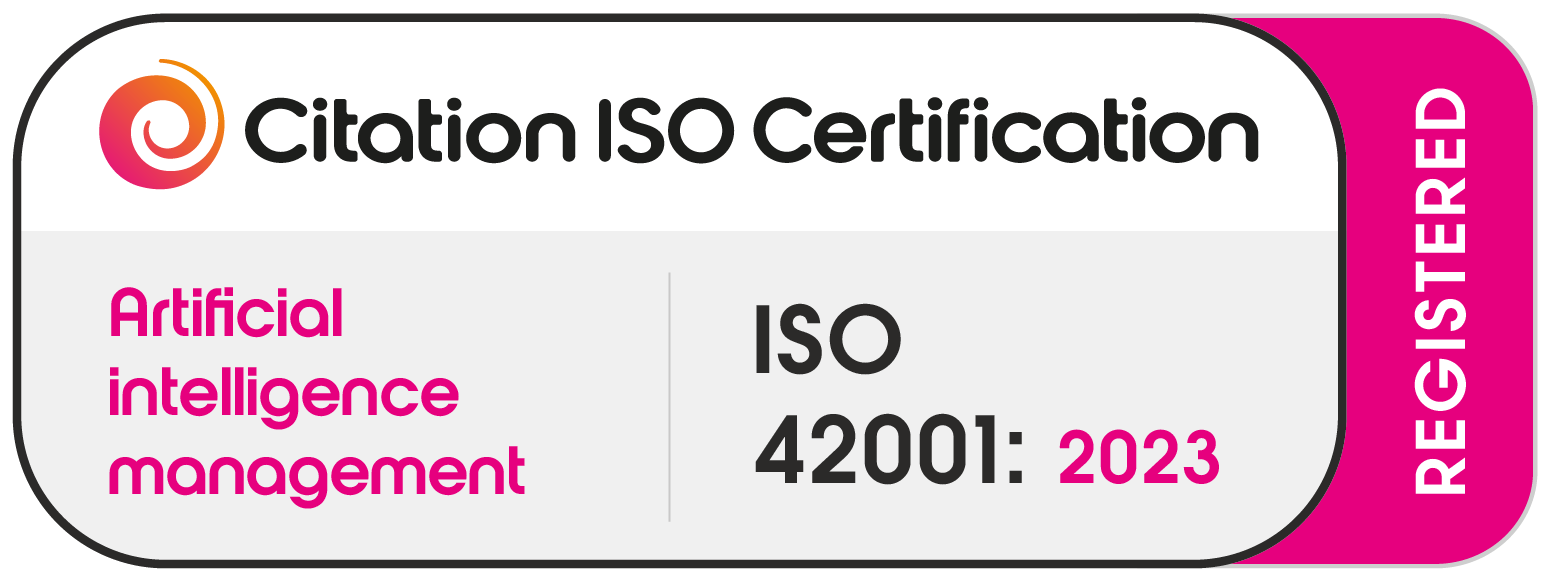Artificial intelligence (AI) is rapidly transforming the built environment, offering innovative solutions to enhance safety, efficiency, and sustainability. However, the adoption of AI also introduces ethical considerations that must be addressed to ensure responsible development and deployment. ISO 42001, the international standard for AI management systems, provides a framework for organisations to navigate these challenges and build trust in their AI solutions.
What is ISO 42001?
ISO 42001 is an emerging standard specifically designed to address the unique requirements of AI management systems. It outlines a structured approach to embedding ethical considerations and trustworthy practices throughout the AI lifecycle, from design and development to deployment and monitoring. By adhering to ISO 42001, it demonstrates commitment to responsible AI governance and ensure their solutions are fair, transparent, and accountable.
Key Principles of ISO 42001
- Bias Mitigation: ISO 42001 emphasizes identifying and mitigating potential biases in AI systems. This is particularly crucial in building safety applications, where biased outcomes could have serious consequences.
- Transparency: The standard promotes transparency in AI decision-making processes, ensuring users understand how AI-derived outcomes are produced and that the reasoning behind AI actions is explainable.
- Accountability: ISO 42001 establishes clear lines of accountability for AI systems. This includes defining roles and responsibilities for overseeing AI development, deployment, and monitoring to ensure ethical considerations are addressed at every stage.
- Continuous Improvement: The standard encourages organisations to continuously monitor and improve their AI systems to address evolving ethical challenges and societal expectations.
The Challange of Achieving ISO 42001 Certification
Gaining ISO 42001 certification is no small feat. The standard demands a rigorous commitment to ethical practices, comprehensive risk assessments, and a proactive approach to addressing challenges throughout the AI lifecycle.
For many organisations, the primary challenge lies in integrating ISO 42001’s principles into existing workflows and legacy systems. This often requires rethinking not only technical processes but also organisational culture and governance structures. Additionally, achieving certification necessitates a thorough documentation of AI processes, extensive training for teams, and robust mechanisms for monitoring and mitigating ethical risks.
Moreover, given the rapid evolution of AI technologies, staying compliant with the standard requires organisations to be agile and adaptable. The certification process is not a one-time effort but an ongoing journey of improvement and alignment with ethical best practices.
Despite these challenges, the rewards—enhanced trust, minimised risks, and a leadership position in ethical AI—make the pursuit of ISO 42001 certification a transformative step for any organisation.
Benefits of ISO 42001 in Building Safety
- Enhanced Trust: By demonstrating adherence to ISO 42001, organisations can build trust with stakeholders, including clients, regulators, and the public. This is essential for the successful adoption of AI in building safety, where trust is paramount.
- Risk Mitigation: ISO 42001 helps organisations identify and mitigate potential ethical risks associated with AI, reducing the likelihood of unintended consequences or harm.
- Innovation: The standard’s focus on ethical considerations can foster innovation by encouraging the development of AI solutions that are not only effective but also socially responsible.
Black Boots' Commitment to ISO 42001
At Black Boots, we recognise the importance of ethical AI governance in building safety. Our AI-powered solutions, BB-SCR and BB-SMS, have been developed and deployed following the principles of ISO 42001. This ensures that our solutions are not only effective but also uphold the highest ethical standards, promoting fairness, transparency, and accountability in building safety practices.
Achieving ISO 42001 certification was no simple task. It required meticulous planning, rigorous evaluation of our AI systems, and a comprehensive alignment of our operations with the ethical principles set forth in the standard. From conducting exhaustive risk assessments to establishing robust monitoring frameworks, every step demanded significant effort and unwavering commitment from our team.
We extend our gratitude to Citation ISO Certification, whose seamless consultation and audit process was instrumental in this achievement. Their expert guidance enabled us to navigate the complexities of the certification requirements with confidence, ensuring we met the stringent standards without unnecessary delays. Their partnership exemplifies how collaboration and expertise can transform a challenging process into a rewarding accomplishment.
By adhering to ISO 42001, we are setting a benchmark for responsible AI in the built environment. This certification is not merely a milestone for Black Boots—it is a testament to our unwavering dedication to leading the way in ethical and innovative AI solutions for building safety.
Last Updated: 21st January 2025



